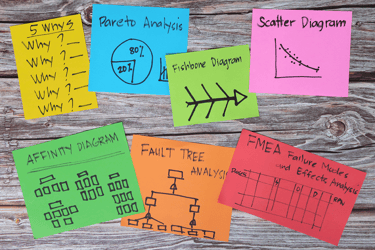The Packaging Industry's Sustainability Challenge: Why ERP Systems Are Essential for Success A straightforward guide to navigating sustainability regulations across folding carton, flexible...
How to choose ERP Software: Insight from an expert
We sat down with Steve Green, an experienced Enterprise Resource Planning (ERP) expert with a strong print and packaging industry background.
As somebody who performs onsite investigations for companies to identify optimization opportunities for their current systems and processes, there seemed no better person to quiz on how to choose the best ERP Software.
What is ERP software?
ERP stands for Enterprise Resource Planning. It's a software solution designed to cover all the requirements of a manufacturing business, from inquiry to invoice. It's a sophisticated system that can handle everything from estimating to order processing, shop floor data collection, and costing. Essentially, you can manage all aspects of the business through one integrated system.
Imagine the scenario: I own an independent company with a single plant. I am considering investing. Is it worth the effort, given that I can oversee the company's operations?
Yes, it’s worth investing in an ERP. It is possible to manage operations using tools like Excel or homegrown systems, and many companies do. However, as the business grows, it becomes increasingly important to understand what's happening within the organization comprehensively.
Good quality data needs to be collected and analyzed to make informed strategic decisions. When the relevant information is spread across multiple systems, obtaining accurate insights and making quick decisions can be difficult. This is where an integrated system becomes crucial, providing timely and accurate information and reports. Therefore, recognizing the need for an efficient integrated system is essential to help grow the business, fine-tune areas, and improve efficiency in specific processes, functions, or departments.
What are the benefits for larger organizations?
In a multi-plant environment, visibility across all sites and awareness of what is happening in each is essential. This knowledge allows for better planning and the ability to adjust and adapt production based on capacity or constraints in different areas. Additionally, standardization of reporting is essential to ensure consistency across the business. It is crucial to have a system that can handle multiple plants, currencies, and languages.
Many companies try to implement different systems for different areas, which can lead to poor visibility across the business. To address this issue, a comprehensive and industry-specific ERP system is recommended for larger multi-plant environments. This solution provides specific functionality that covers different market sectors, such as flexible packaging, folding cartons, and labels. This industry-specific solution is ideal if a company produces multiple products across the segments within the packaging sector.
Could I hire a team of IT specialists to code a system that meets all my specific needs? I want a system that can answer all my questions and help me operate in a way tailored to my business.
Many companies rely on homegrown systems, which one or two IT specialists often maintain. These individuals need help keeping up with industry developments and business demands, and the software cannot be developed quickly enough. As a result, the company becomes heavily dependent on these individuals, and if they decide to leave, it leaves a knowledge gap within the business.
Investing in a software solution from a company specializing in IT solutions is essential to keep up with the constantly changing software landscape and industry demands. If you are a packaging company, your expertise is in packaging rather than IT. Our company has spent over 30 years investing in a suite of packaging solutions with the help of over 100 experts and feedback from a global network of customers. Creating a software solution that covers all the required eventualities takes a lot of time, effort, and resources. Therefore, investing in a software solution can be a big step, and keeping your resources intact while trying to run a packaging business is essential.It looks like there are different ERP options available for a business: generic ERPs, homegrown ERPs, and industry-specific ERPs. Let's start with the generic ERP. Why do you think they should be considered?
A wide range of software options are available in the market, and these options vary in functionality and quality. While many small vendors offer powerful functionalities, more prominent vendors tend to be more prevalent due to their extensive support offerings. These vendors have teams of skilled developers who have worked on their systems for several years, making them more polished and robust. As a result, these systems have powerful functionalities that make them attractive to potential buyers.
However, one downside to those large vendors is that they have created their systems for use in multiple industries, including banking, finance, retail, and automotive. As a result, their software is more generic and less tailored to specific industries such as print and packaging. Therefore, when selecting software, it's essential to consider the industry's particular requirements and chose a system that offers functionalities tailored to those needs.
Can you recap and expand on your thoughts about homegrown systems?
Many companies today have in-house developers who build customized systems to cater to the business's specific needs. Developing such systems requires significant time, effort, and resources, and it's crucial to keep updating and advancing the software to stay relevant in the market. As businesses grow and evolve, so do their customers' demands, which means that companies must keep up with the constant demand for software development to ensure that their systems work well and continue to benefit the business.
It's essential to stay ahead of the curve and keep the software updated to meet the changing needs of the business.
The challenge is that you may have become overly reliant on your in-house developers. As mentioned earlier, if they leave the company or move on for any reason, you may experience a significant loss of knowledge. On the other hand, if you purchase software from a vendor, they have dedicated in-house development and support teams that provide ongoing support for your business. This means you can focus on your core competencies while relying on your software vendor for IT-related support.
Let's discuss industry-specific topics and their importance.
The industry-specific systems are extremely detailed and well-developed; hundreds of developers and industry experts have worked for decades to achieve such a high level of functionality.
ePS Radius ERP software, for example, is specifically designed to cater to the unique requirements of the packaging industry. It includes features that account for the peculiarities of a packaging environment, such as late changes, small run lengths, material libreries, and specific customer requirements. These features are integrated into the system to help our customers remain competitive and improve their business efficiency.
It is essential to incorporate knowledge and understanding into the system to develop it and make it specific to the requirements. For instance, if you have certain estimating or scheduling requirements, it is crucial to understand the industry's needs to integrate them into the software effectively. Our team comprises individuals who have been with our business for a long time or come from the industry, so they understand the industry's requirements, terminologies, and the need to create workflows that match those requirements.
We dedicate significant time to attending conferences to stay updated on the latest industry trends and developments. We use the insights and requirements gained from these events to enhance our software. Additionally, we have a user group committee and community that provide us with valuable feedback that helps us improve and expand the system.
Building the proper skill set is crucial for businesses to ensure a seamless implementation process and timely onboarding of employees. When we take on a project, our experienced project managers and implementation consultants are well-versed in the nuances of packaging and other relevant details. This knowledge and experience enables them to quickly dive in and start working, saving valuable time and resources while delivering exceptional results to our clients.
Conclusion
Packaging companies should consider using a packaging-specific ERP. The problem with choosing a generic Enterprise Resource Planning System (ERP) is that although it provides good functionality, making it specific for packaging requires additional development time and effort. This detracts from the implementation and increases costs significantly. Most businesses that choose the generic route never develop a fully functioning manufacturing solution. While they may get the finance side up and running, manufacturing is much more complex and demands a deeper understanding of the business.
On the other hand, industry-specific ERPs can provide the required functionality straight out of the box. These systems can also be linked to generic finance systems, providing a complete business solution.




